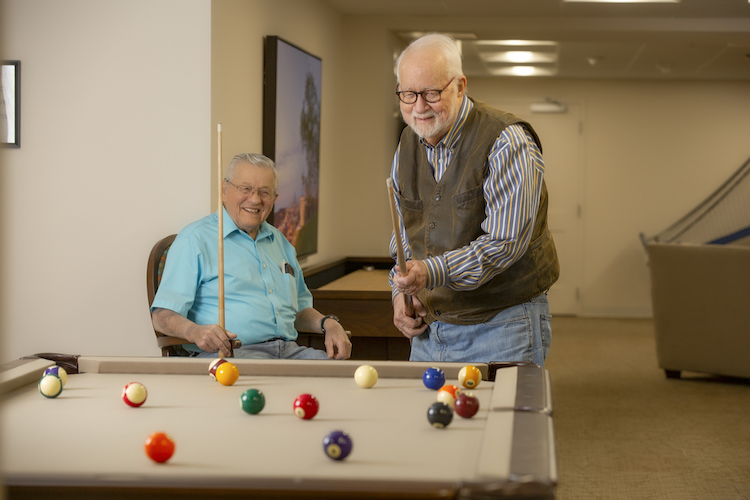September is World Alzheimer’s Disease Month, an ideal time to learn about memory loss disease and the world of senior living. In honor of our beloved memory care residents who live with Alzheimer’s or similar forms of dementia every single day, let’s learn about this memory loss disease and how you can do your part to show love and support on a personal and societal level.
Alzheimer’s Disease is truly heartbreaking, both for the people experiencing it and those who love them. But here at St. Anthony’s, we do everything we can to help our Memory Care residents experience life’s joys. While this season of life can feel painful, we believe it can also be meaningful and joyful.
What is Alzheimer’s Disease?
Alzheimer’s disease is the most common cause of dementia — or memory loss — along with other cognitive limitations that interfere with daily life over time. As much as 80% of dementia cases can be linked to Alzheimer’s disease, and while it can be treated with some medications and practical caregiver support, there is no cure.
Alzheimer’s typically occurs in seniors over the age of 65. Over time, Alzheimer’s increases in severity, starting with mild memory loss, with which many seniors can still live with relatively high independence. As the disease progresses, it becomes more difficult (and unsafe) for a person with an Alzheimer’s diagnosis to go unsupervised in their day-to-day life. Alzheimer’s and other memory loss diseases are also heavily linked to mental health as we age, progressing much more rapidly in seniors who are isolated or experiencing symptoms of depression.
Symptoms of Early Stage Alzheimer’s
In the early stages of Alzheimer’s, the person struggling with dementia can often continue their life as usual. They may experience memory lapses, but these shouldn’t affect their ability to do everyday activities like driving, working, and socializing.
Some common symptoms experienced in the early stages of Alzheimer’s may include:
- Forgetting familiar words or names
- Difficulty retaining new information
- Forgetting something they just read
- Struggling to perform tasks in a social or lively setting
- Trouble planning or organizing
Symptoms of Middle Stage Alzheimer’s
As Alzheimer’s disease progresses, so does a person’s need for more attentive care. This middle stage of Alzheimer’s is often the longest, and it is where dementia symptoms become much more noticeable and difficult to manage alone.
While symptoms will vary in occurrence and severity, people with middle-stage Alzheimer’s may live with the following:
- Forgetting personal history and personal information (birthday, phone number, address, etc.)
- Being confused about what day it is or where they are
- Needing assistance with activities of daily living (ADLs) like getting dressed appropriately for the weather or season
- Showing signs of social withdrawal or moodiness in socially or mentally active situations
- Difficulty controlling bodily functions (i.e. may require support through incontinence care)
- Prone to wandering about and getting lost
- Shifts in personality toward paranoia, delusions, or compulsive behaviors
During this stage, people with Alzheimer’s are typically still capable of having an active and healthy lifestyle. While tasks and activities may need to be simplified or adapted to their unique capabilities, preferences, and needs, they can still live a thriving and joy-filled life when given the support they need!
Symptoms of Late Stage Alzheimer’s
Dementia symptoms are the most severe during the final stage of Alzheimer’s disease, which usually occurs close to the end of life. Seniors experiencing late-stage Alzheimer’s disease may be limited in their ability to converse or interact with their environment. Some signs that a person with Alzheimer’s is shifting into the severe late stage may include:
- Loss of awareness of their surroundings
- Significant physical limitations (inability to walk, sit, or swallow)
- Limited or lost ability to communicate
- Heightened vulnerability to infections such as pneumonia
How Memory Care Helps Seniors with Alzheimer’s Disease
Most loved ones are neither trained nor capable of providing the intensive care a person with Alzheimer’s disease requires, especially in the middle and late stages. Because round-the-clock care is essential for the best quality of life and the safety of the person struggling with memory loss, finding them a supportive and loving home in memory care can make a huge difference in how a person finds joy and fulfillment after diagnosis!
Memory care reduces stress for seniors by providing them with the care they need in a familiar environment where they have safety, comfort, and caregivers who know them on a deeply personal level and can advocate for their wants and needs each day. When looking for memory care for a loved one, finding a facility that cares for the whole person and helps your friend or family member feel right at home is important. This means providing for them physically and medically, but also mentally, emotionally, and even spiritually.
How to Show Your Support This Month
Even if you don’t have a loved one living with an Alzheimer’s disease diagnosis, you can show your support during World Alzheimer’s Disease Month in several ways! Here are some suggestions for getting involved in education and support:
- Share this blog or informative articles about Alzheimer’s disease with people who may be struggling with a recent diagnosis for themselves or a loved one
- Donate to organizations like the Alzheimer’s Association which are dedicated to both raising awareness and researching the disease in search of better treatment and a cure
- Join the 2023 Walk to End Alzheimer’s on Saturday, October 7th right here in Kansas City!
- Look for volunteer opportunities in your local area, whether through fundraising events, community support, or advocating for public policy change
- Talk with someone experiencing an Alzheimer’s diagnosis
Memory Care at St. Anthony’s
If you or a loved one have recently received an Alzheimer’s diagnosis or are struggling with progressing symptoms of dementia, we would be honored to have you join the St. Anthony’s community.
Contact us today to schedule a tour and learn more about memory care at St. Anthony’s Senior Living Community.




